Reflective Journal on Challenges for Cyber Security in Business
VerifiedAdded on 2020/03/13
|6
|1324
|781
Journal and Reflective Writing
AI Summary
This reflective journal details a 12-week research process focused on the challenges of cyber security in business. It covers the initiation, planning, literature review, research proposal, sampling, data collection, and analysis phases. The journal reflects on the learning experience, highlighting the acquisition of research methodologies, understanding of cyber security issues, and the development of skills to manage project risks. It emphasizes the usefulness of this learning for professional growth and future career opportunities in the field of cyber security, including the application of measures to avoid and prevent security risks. The research activities involved a series of phases and activities, including the identification of cyber-attacks, the impact on businesses and end-users, and the role of end-user negligence. The journal also evaluates the learning process and its direct relation to the business research, providing insights into the research methodologies and processes involved. The learning gained is deemed extremely useful and applicable in the future for professional development, career prospects, and future research endeavors. References to various resources used during the research are also provided.
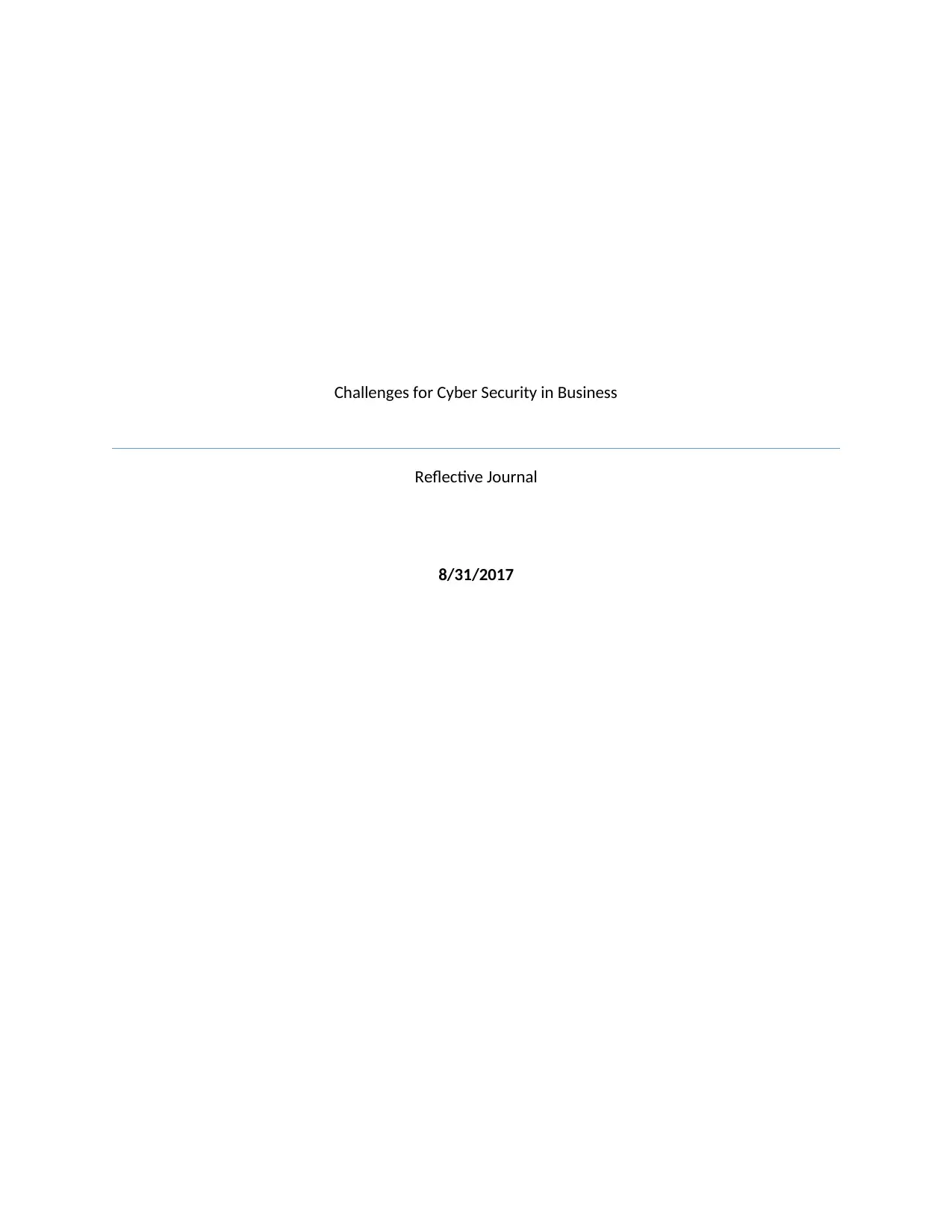
Challenges for Cyber Security in Business
Reflective Journal
8/31/2017
Reflective Journal
8/31/2017
Paraphrase This Document
Need a fresh take? Get an instant paraphrase of this document with our AI Paraphraser

Reflective Journal
Reflective Journal
The research process was completed in duration of 12 weeks. The first week was the initiation
week that included the selection of the research topic as Challenges for Cyber Security in
Business and a feasibility studied was also carried out. The research was feasible and the results
were documented.
The second week of the research process included the planning of research scope and research
questions. The research methodologies as qualitative and quantitative methods of research were
found to be apt for the chosen topic. A research plan was completed in the second week (Polyu,
2002).
A literature review was carried out in the third week. There were case studies of three different
companies that were studied and analyzed to understand the cyber-attacks and issues that were
prevailing. There were also other research journals and articles that were studied and referenced.
In Week 4 and 5, a research proposal was prepared which included the gaps that were identified,
research methodologies along with the limitations and timeline.
Week 6 included the sampling process that was required for research execution. There were
small and large sample sizes that were identified for the research execution (Watkins, 2007).
The next two week, that is, week 7 and week 8 included that identification of the data sources
such as organizational documents, online articles, libraries and likewise to gain more and more
information on the challenges that were associated with cyber-security in business.
Data analysis was carried out in Week 9 and 10. The data that was collected was analyzed to
understand the patterns and the trends that were associated. The results were then compiled and
documented (Niu, 2014).
The last two weeks were kept reserved for the review and presentation part. The research work
that was done was reviewed by the guides, mentors and specialists and the feedback was
incorporated. The final research paper was then presented as the last step in the research work.
2
Reflective Journal
The research process was completed in duration of 12 weeks. The first week was the initiation
week that included the selection of the research topic as Challenges for Cyber Security in
Business and a feasibility studied was also carried out. The research was feasible and the results
were documented.
The second week of the research process included the planning of research scope and research
questions. The research methodologies as qualitative and quantitative methods of research were
found to be apt for the chosen topic. A research plan was completed in the second week (Polyu,
2002).
A literature review was carried out in the third week. There were case studies of three different
companies that were studied and analyzed to understand the cyber-attacks and issues that were
prevailing. There were also other research journals and articles that were studied and referenced.
In Week 4 and 5, a research proposal was prepared which included the gaps that were identified,
research methodologies along with the limitations and timeline.
Week 6 included the sampling process that was required for research execution. There were
small and large sample sizes that were identified for the research execution (Watkins, 2007).
The next two week, that is, week 7 and week 8 included that identification of the data sources
such as organizational documents, online articles, libraries and likewise to gain more and more
information on the challenges that were associated with cyber-security in business.
Data analysis was carried out in Week 9 and 10. The data that was collected was analyzed to
understand the patterns and the trends that were associated. The results were then compiled and
documented (Niu, 2014).
The last two weeks were kept reserved for the review and presentation part. The research work
that was done was reviewed by the guides, mentors and specialists and the feedback was
incorporated. The final research paper was then presented as the last step in the research work.
2
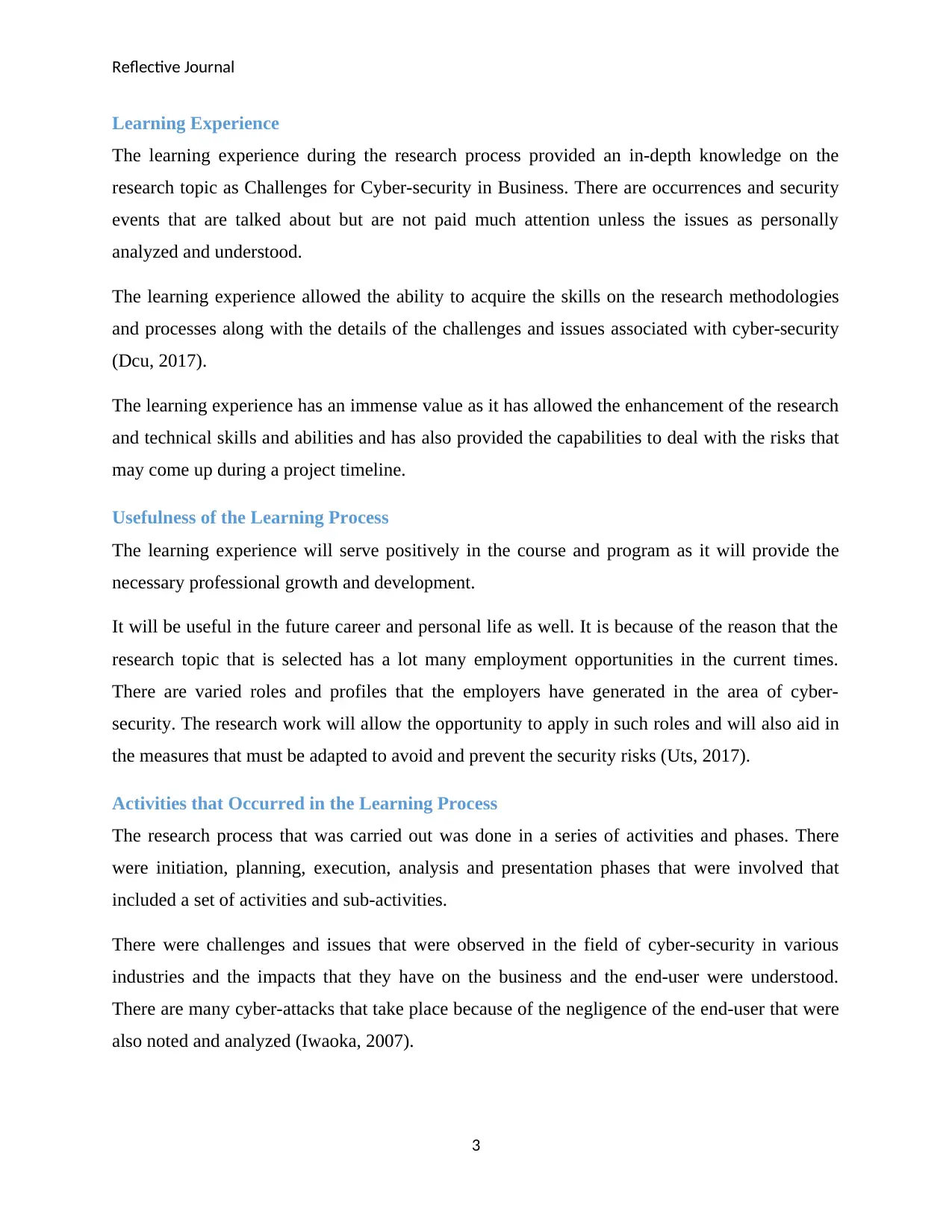
Reflective Journal
Learning Experience
The learning experience during the research process provided an in-depth knowledge on the
research topic as Challenges for Cyber-security in Business. There are occurrences and security
events that are talked about but are not paid much attention unless the issues as personally
analyzed and understood.
The learning experience allowed the ability to acquire the skills on the research methodologies
and processes along with the details of the challenges and issues associated with cyber-security
(Dcu, 2017).
The learning experience has an immense value as it has allowed the enhancement of the research
and technical skills and abilities and has also provided the capabilities to deal with the risks that
may come up during a project timeline.
Usefulness of the Learning Process
The learning experience will serve positively in the course and program as it will provide the
necessary professional growth and development.
It will be useful in the future career and personal life as well. It is because of the reason that the
research topic that is selected has a lot many employment opportunities in the current times.
There are varied roles and profiles that the employers have generated in the area of cyber-
security. The research work will allow the opportunity to apply in such roles and will also aid in
the measures that must be adapted to avoid and prevent the security risks (Uts, 2017).
Activities that Occurred in the Learning Process
The research process that was carried out was done in a series of activities and phases. There
were initiation, planning, execution, analysis and presentation phases that were involved that
included a set of activities and sub-activities.
There were challenges and issues that were observed in the field of cyber-security in various
industries and the impacts that they have on the business and the end-user were understood.
There are many cyber-attacks that take place because of the negligence of the end-user that were
also noted and analyzed (Iwaoka, 2007).
3
Learning Experience
The learning experience during the research process provided an in-depth knowledge on the
research topic as Challenges for Cyber-security in Business. There are occurrences and security
events that are talked about but are not paid much attention unless the issues as personally
analyzed and understood.
The learning experience allowed the ability to acquire the skills on the research methodologies
and processes along with the details of the challenges and issues associated with cyber-security
(Dcu, 2017).
The learning experience has an immense value as it has allowed the enhancement of the research
and technical skills and abilities and has also provided the capabilities to deal with the risks that
may come up during a project timeline.
Usefulness of the Learning Process
The learning experience will serve positively in the course and program as it will provide the
necessary professional growth and development.
It will be useful in the future career and personal life as well. It is because of the reason that the
research topic that is selected has a lot many employment opportunities in the current times.
There are varied roles and profiles that the employers have generated in the area of cyber-
security. The research work will allow the opportunity to apply in such roles and will also aid in
the measures that must be adapted to avoid and prevent the security risks (Uts, 2017).
Activities that Occurred in the Learning Process
The research process that was carried out was done in a series of activities and phases. There
were initiation, planning, execution, analysis and presentation phases that were involved that
included a set of activities and sub-activities.
There were challenges and issues that were observed in the field of cyber-security in various
industries and the impacts that they have on the business and the end-user were understood.
There are many cyber-attacks that take place because of the negligence of the end-user that were
also noted and analyzed (Iwaoka, 2007).
3
⊘ This is a preview!⊘
Do you want full access?
Subscribe today to unlock all pages.

Trusted by 1+ million students worldwide
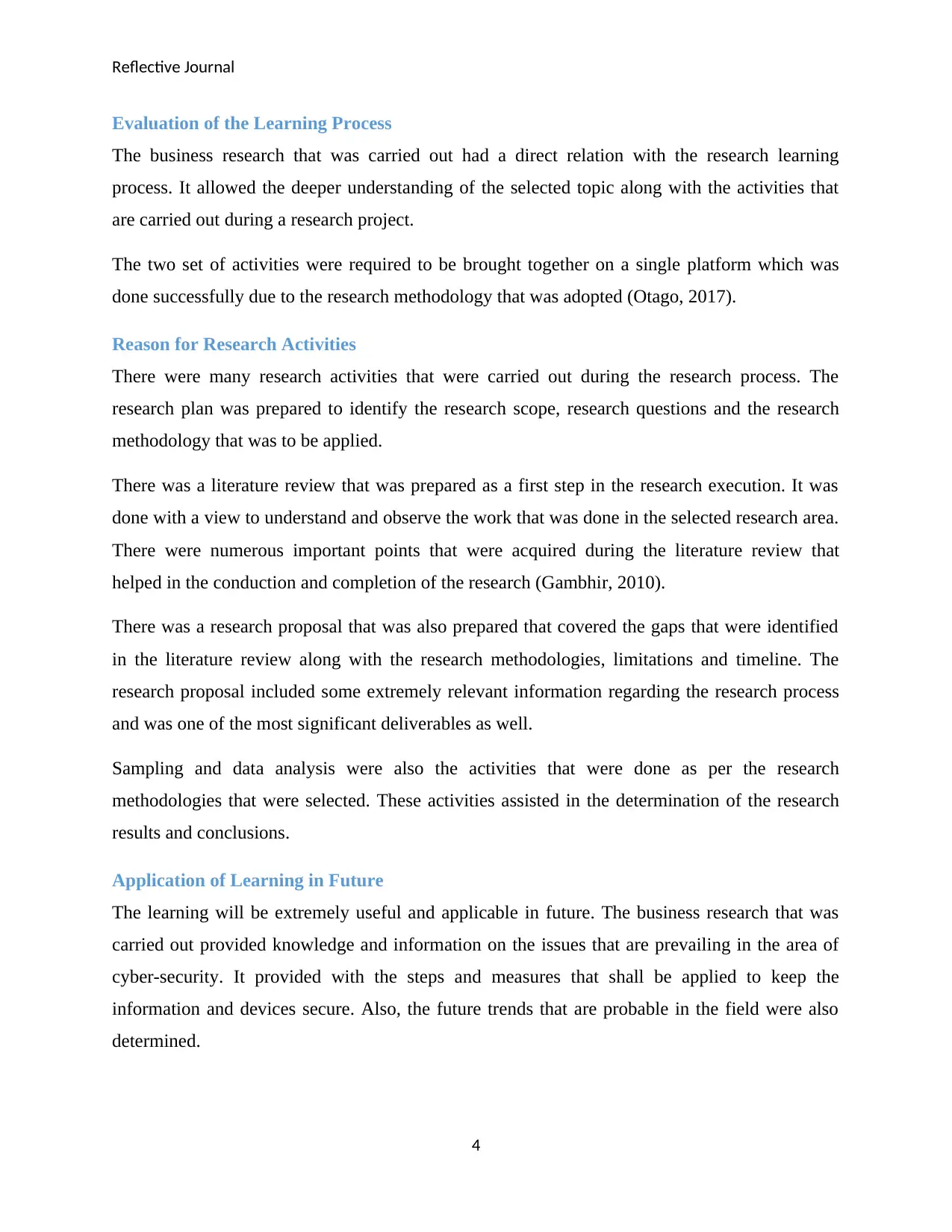
Reflective Journal
Evaluation of the Learning Process
The business research that was carried out had a direct relation with the research learning
process. It allowed the deeper understanding of the selected topic along with the activities that
are carried out during a research project.
The two set of activities were required to be brought together on a single platform which was
done successfully due to the research methodology that was adopted (Otago, 2017).
Reason for Research Activities
There were many research activities that were carried out during the research process. The
research plan was prepared to identify the research scope, research questions and the research
methodology that was to be applied.
There was a literature review that was prepared as a first step in the research execution. It was
done with a view to understand and observe the work that was done in the selected research area.
There were numerous important points that were acquired during the literature review that
helped in the conduction and completion of the research (Gambhir, 2010).
There was a research proposal that was also prepared that covered the gaps that were identified
in the literature review along with the research methodologies, limitations and timeline. The
research proposal included some extremely relevant information regarding the research process
and was one of the most significant deliverables as well.
Sampling and data analysis were also the activities that were done as per the research
methodologies that were selected. These activities assisted in the determination of the research
results and conclusions.
Application of Learning in Future
The learning will be extremely useful and applicable in future. The business research that was
carried out provided knowledge and information on the issues that are prevailing in the area of
cyber-security. It provided with the steps and measures that shall be applied to keep the
information and devices secure. Also, the future trends that are probable in the field were also
determined.
4
Evaluation of the Learning Process
The business research that was carried out had a direct relation with the research learning
process. It allowed the deeper understanding of the selected topic along with the activities that
are carried out during a research project.
The two set of activities were required to be brought together on a single platform which was
done successfully due to the research methodology that was adopted (Otago, 2017).
Reason for Research Activities
There were many research activities that were carried out during the research process. The
research plan was prepared to identify the research scope, research questions and the research
methodology that was to be applied.
There was a literature review that was prepared as a first step in the research execution. It was
done with a view to understand and observe the work that was done in the selected research area.
There were numerous important points that were acquired during the literature review that
helped in the conduction and completion of the research (Gambhir, 2010).
There was a research proposal that was also prepared that covered the gaps that were identified
in the literature review along with the research methodologies, limitations and timeline. The
research proposal included some extremely relevant information regarding the research process
and was one of the most significant deliverables as well.
Sampling and data analysis were also the activities that were done as per the research
methodologies that were selected. These activities assisted in the determination of the research
results and conclusions.
Application of Learning in Future
The learning will be extremely useful and applicable in future. The business research that was
carried out provided knowledge and information on the issues that are prevailing in the area of
cyber-security. It provided with the steps and measures that shall be applied to keep the
information and devices secure. Also, the future trends that are probable in the field were also
determined.
4
Paraphrase This Document
Need a fresh take? Get an instant paraphrase of this document with our AI Paraphraser
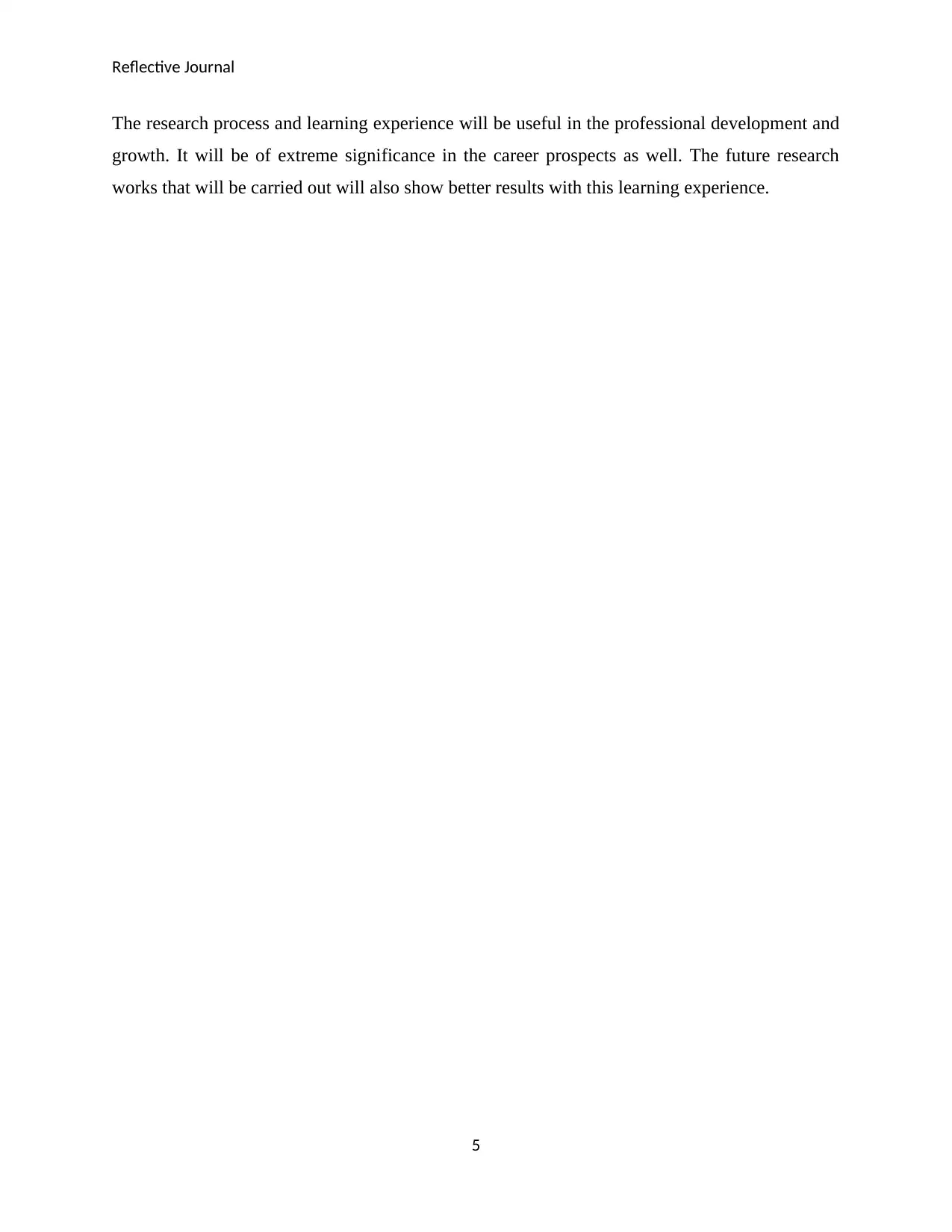
Reflective Journal
The research process and learning experience will be useful in the professional development and
growth. It will be of extreme significance in the career prospects as well. The future research
works that will be carried out will also show better results with this learning experience.
5
The research process and learning experience will be useful in the professional development and
growth. It will be of extreme significance in the career prospects as well. The future research
works that will be carried out will also show better results with this learning experience.
5
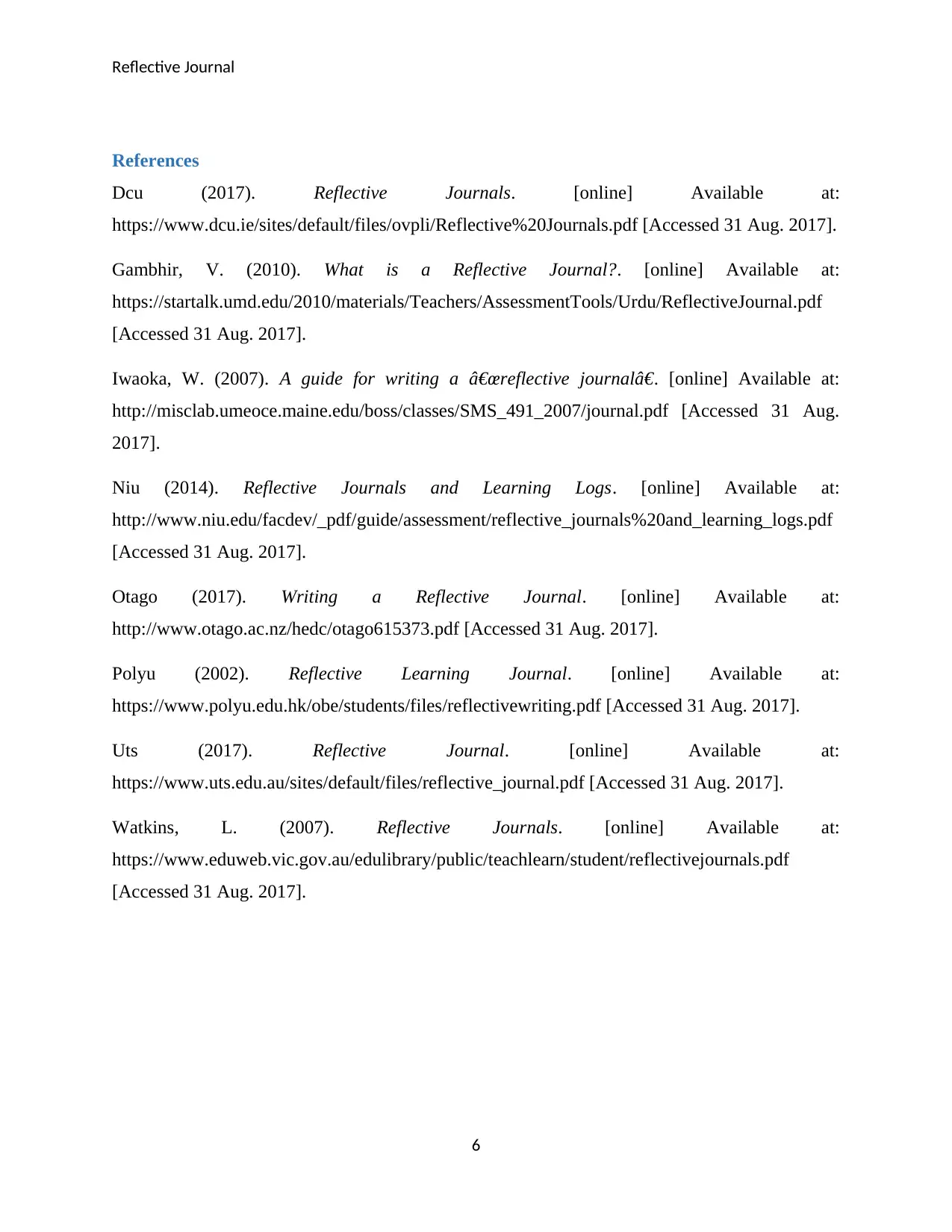
Reflective Journal
References
Dcu (2017). Reflective Journals. [online] Available at:
https://www.dcu.ie/sites/default/files/ovpli/Reflective%20Journals.pdf [Accessed 31 Aug. 2017].
Gambhir, V. (2010). What is a Reflective Journal?. [online] Available at:
https://startalk.umd.edu/2010/materials/Teachers/AssessmentTools/Urdu/ReflectiveJournal.pdf
[Accessed 31 Aug. 2017].
Iwaoka, W. (2007). A guide for writing a “reflective journal†. [online] Available at:
http://misclab.umeoce.maine.edu/boss/classes/SMS_491_2007/journal.pdf [Accessed 31 Aug.
2017].
Niu (2014). Reflective Journals and Learning Logs. [online] Available at:
http://www.niu.edu/facdev/_pdf/guide/assessment/reflective_journals%20and_learning_logs.pdf
[Accessed 31 Aug. 2017].
Otago (2017). Writing a Reflective Journal. [online] Available at:
http://www.otago.ac.nz/hedc/otago615373.pdf [Accessed 31 Aug. 2017].
Polyu (2002). Reflective Learning Journal. [online] Available at:
https://www.polyu.edu.hk/obe/students/files/reflectivewriting.pdf [Accessed 31 Aug. 2017].
Uts (2017). Reflective Journal. [online] Available at:
https://www.uts.edu.au/sites/default/files/reflective_journal.pdf [Accessed 31 Aug. 2017].
Watkins, L. (2007). Reflective Journals. [online] Available at:
https://www.eduweb.vic.gov.au/edulibrary/public/teachlearn/student/reflectivejournals.pdf
[Accessed 31 Aug. 2017].
6
References
Dcu (2017). Reflective Journals. [online] Available at:
https://www.dcu.ie/sites/default/files/ovpli/Reflective%20Journals.pdf [Accessed 31 Aug. 2017].
Gambhir, V. (2010). What is a Reflective Journal?. [online] Available at:
https://startalk.umd.edu/2010/materials/Teachers/AssessmentTools/Urdu/ReflectiveJournal.pdf
[Accessed 31 Aug. 2017].
Iwaoka, W. (2007). A guide for writing a “reflective journal†. [online] Available at:
http://misclab.umeoce.maine.edu/boss/classes/SMS_491_2007/journal.pdf [Accessed 31 Aug.
2017].
Niu (2014). Reflective Journals and Learning Logs. [online] Available at:
http://www.niu.edu/facdev/_pdf/guide/assessment/reflective_journals%20and_learning_logs.pdf
[Accessed 31 Aug. 2017].
Otago (2017). Writing a Reflective Journal. [online] Available at:
http://www.otago.ac.nz/hedc/otago615373.pdf [Accessed 31 Aug. 2017].
Polyu (2002). Reflective Learning Journal. [online] Available at:
https://www.polyu.edu.hk/obe/students/files/reflectivewriting.pdf [Accessed 31 Aug. 2017].
Uts (2017). Reflective Journal. [online] Available at:
https://www.uts.edu.au/sites/default/files/reflective_journal.pdf [Accessed 31 Aug. 2017].
Watkins, L. (2007). Reflective Journals. [online] Available at:
https://www.eduweb.vic.gov.au/edulibrary/public/teachlearn/student/reflectivejournals.pdf
[Accessed 31 Aug. 2017].
6
⊘ This is a preview!⊘
Do you want full access?
Subscribe today to unlock all pages.

Trusted by 1+ million students worldwide
1 out of 6
Related Documents
Your All-in-One AI-Powered Toolkit for Academic Success.
+13062052269
info@desklib.com
Available 24*7 on WhatsApp / Email
![[object Object]](/_next/static/media/star-bottom.7253800d.svg)
Unlock your academic potential
Copyright © 2020–2026 A2Z Services. All Rights Reserved. Developed and managed by ZUCOL.





